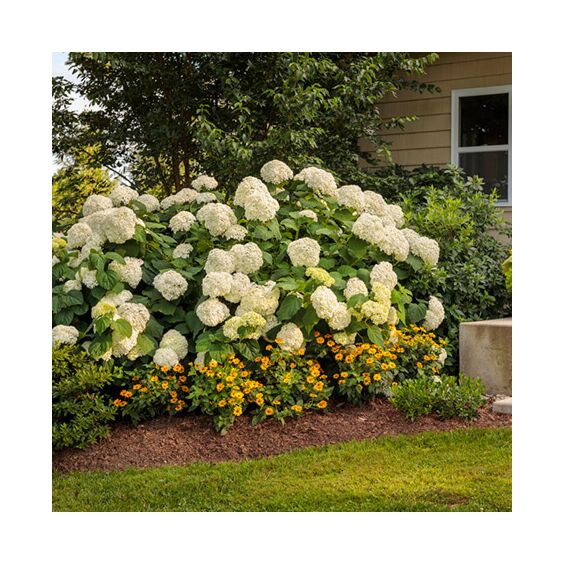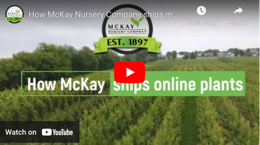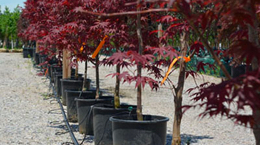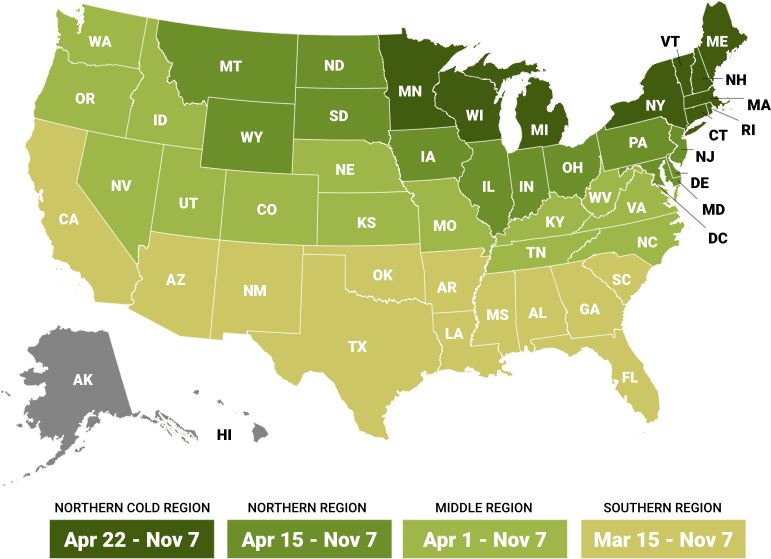
Growing zones
See Zone Map >Status: In stock
Enhance Your Garden with Homegrown Plants from McKay Nursery Here at McKay Nursery, our curated selection of hardy plants, including the vibrant Incrediball® smooth hydrangea. Choose us for your gardening needs, and you'll benefit from our 125+ years of nursery experience. Order from us today if you want to grow Incrediball® hydrangea for your garden!
For more information, contact us at [email protected] or call us at 920-478-2121.
- Sun, Part Sun/Shade, Shade
Mature Plant Size (H x W): 4-5' x 4-5'
Bloom Season: Summer, Fall
- Salt Tolerant
- Long Blooming
- Award Winning
- Walnut Toxicity Resistant
- Attracts Butterflies
- Cut Flower
- Attracts Pollinators
Planting & Care for Incrediball® Hydrangea Plants/Shrubs
Preparation
- These shrubs need damp soil high in organic matter.
- Improve poor soil areas by digging in plenty of well-decayed manure or compost a few months ahead of planting.
- Plant Incrediball® hydrangea between March and November.
- Pick a spot that has dappled sunlight or morning sun and afternoon shade.
- Make sure they are sheltered from frosty winds, which will damage blossoms.
- This plant tolerates a wide range of conditions but does not grow well in soggy soil.
- Plant in full sun in zones 3-9; afternoon shade is preferable in warmer areas.
- Cut the entire plant back by one-third of its height each spring for new growth to emerge.
Opening Plant Material
- Containers: Completely saturate all container plants by putting them in a larger water container until bubbling stops. Remove the plant, then dig a hole no deeper than the depth of the container, ensuring it’s wider on the sides by an additional 6” or more.
Planting Containers
- Hydrangeas can be planted from March to November.
- Dig a hole no deeper than the depth of the container and 6" or wider on the sides.
- Slide the plant from the pot by tapping on the bottom of the pot.
- With a shovel or knife, trim the bottom 2" off the root ball for plants in plastic containers.
- Rotate the plant to the proper position. Never lift or move plants by the tops.
- Place the root ball in the hole.
- Adjust the plant height so the root crown is slightly higher than the ground.
- Notice where the base of the trunk flares out from the tree. This is called the root flare. This root flare should show when the tree is planted. Add soil under the ball so the root flare is exposed if necessary.
- Place fertilizer packets into the bottom of the hole (if purchased). *Use Our Recommended Fertilizer.
- Backfill the hole with soil, ensuring the top of the root ball is visible and slightly higher than the soil around it.
- Firm the soil around the plant. Water well to settle soil around the root ball.
Water frequently when newly planted. - Mulch plants with well-rotted organic matter after planting.
- Check out our Planting & Handling Guide for additional planting tips and illustrations.
Pruning - After Planting
- Containers: Although it’s not essential after planting, light pruning can help shape a Smooth hydrangea shrub. Doing so removes any broken branches from shipping or thins out a heavily branched plant to assist in the transplanting process and the appearance of your new planting.
Pruning - Through-out the Season
- Hydrangeas can be pruned in March and April.
- With hydrangeas, various types come with different pruning practices.
- Hydrangea macrophylla - Cut off spent flowers in spring and remove crowding shoots.
- Hydrangea paniculata - Prune stems to within two buds of the base in late March.
- Hydrangea petiolaris - Cut out unwanted shoots when flowers fade.
- Hydrangea villosa - Remove a third of older stems in spring.
Watering - After Planting
- Plants typically take approximately 6 weeks to establish new roots in your soil. During this period, water plants as often as every 2-4 days at the start and at least a minimum of once per week.
- Beyond the six-week establishment period, water once per week unless rain occurs.
- Remember to check soil moisture by sticking your finger into the soil around 3”.
Watering - Throughout the Season
- After the first season, plants should only be watered during extended periods without rain.
- How do you know if your plants need water? The easiest way to tell is to touch the soil around the roots. If it is moist, there is no need to water. If it’s dry, give it a good soak with the hose end (no nozzle), watering the soil only, not the leaves.
- Same as after planting, stick your finger into the soil around 3” to check soil moisture.
Frequently Asked Questions
What is the best growing zone for Incrediball® smooth hydrangea?
What are the common diseases of Incrediball® smooth hydrangea?
How to get Incrediball® smooth hydrangea flowers to bloom
Your choice of fertilizer should have high phosphorus content instead of nitrogen; otherwise, it will lead to lush foliage with no flowers.
Ideally, the right amount of sunlight for hydrangeas is six hours, so ensure your plants get enough time under the sun.
Proper pruning should be done after the first hard frost in the fall. Doing so prevents any accidental removal of flower buds when pruning in spring.
If your hydrangea shrubs are still not blooming, they may not be fully established yet. It may take another before they display their full bloom.
What pests are common to Incrediball® smooth hydrangea?
Aphids can easily be removed by blasting water from a hose, but you can also keep them away by cleaning your garden. Clearing any leaf litter or weeds can reduce the chances of aphids appearing on your hydrangeas.
You can also use insecticidal soap to control heavier infestations.
Do Incrediball® smooth hydrangea blooms stay as white flowers?
The change in color change is the result of fewer daylight hours as the summer progresses. Since the plant receives less energy from sunlight, the flowers adjust their ability to retain the white color.
Planting & Handling Help
Download our Planting and Handling Guide below to plan for a successful arrival and install of your plants. Be sure to water all plants as soon as they arrive and every day until you’re ready to plant. Keep any bare root bundles in a shady, cool spot with the roots covered at all times.


Learn More
Watch our videos on handling bare root plants, how your order is prepared for shipment and more.


Plant Sizing
What is the difference between Containers, Grow Bags, Bare Root, and Balled & Burlap (B&B)?
Shipping Times


Our FedEx and local shipping times depend on two factors, one is by the region and the second is the type of product being shipped. For example, small fruits are only shipped in spring, but majority of our perennials are shipped from spring until fall. Keep in mind the dates below act as a general guide. Due to unpredictable weather, staffing, inventory and industry demands these timelines can change. Therefore, we cannot guarantee any of these times.
Shipping Dates by Region*
Northern Cold Region: April 22nd - November 7th
Northern Region: April 15th - November 7th
Middle Region: April 1st - November 7th
Southern Region: March 15th - November 7th
Local Delivery (small radius from Waterloo, WI): April 22nd - November 7th
Shipping Dates by Season*
Spring Shipping: Region Start Date (above) - May
Fall Shipping: September - November
Due to unpredictable weather, these times may vary. Some varieties are exceptions due to heat and plant health reasons. Enter your shipping zip code at the top of this page and be sure to check the shipping information on each product before you add it to your cart. If the product is too large or restricted in your state, you will not be able to checkout with that item in your cart.







